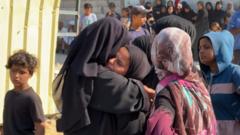During a designated women-only aid day in Gaza, chaos erupted as security forces intervened, leading to the tragic deaths of two women, including Mary Sheikh al-Eid. This highlights the dire humanitarian crisis in the region, exacerbated by restricted aid access and a fraught distribution system.
Tragic Chaos Unfolds During Women's Aid Day in Gaza

Tragic Chaos Unfolds During Women's Aid Day in Gaza
A women-only aid distribution initiative by the Gaza Humanitarian Foundation ended in chaos and tragedy, exemplifying the intense struggles faced by civilians amidst the ongoing conflict.
In a heart-wrenching incident, what was meant to be a focused aid distribution for women in Gaza devolved into chaos and tragedy on Thursday. The Gaza Humanitarian Foundation (GHF) had advertised a women-only day for food distribution, aimed at providing relief to those struggling for basic necessities amid the ongoing conflict. However, the event quickly turned into a scene of horror.
Mary Sheikh al-Eid, a mother of seven, was making her way to the aid distribution site following the death of her husband in the war. Her sister Khawla recounted how desperate the family had been for food, having survived on only lentil soup for weeks. Despite her children's fears about the risks involved, Mary was determined to attend the aid day, believing that fewer numbers would ease the situation.
As they arrived at the location in Rafah, chaos already reigned. Crowds of women surged towards the aid distribution point, where security personnel struggled to manage the flow. Eyewitness accounts describe how women were met with pepper spray and stun grenades, instigating panic among the attendees. In the fray, Mary and Khawla became separated.
Desperate to find her sister, Khawla received the devastating news that Mary had been shot in the head. By the time she reached her sister at Nasser hospital in Khan Younis, it was too late—Mary's life had been tragically cut short. She was one of two women reported killed that day as violence flared outside the aid distribution center.
The GHF's aid system, which began operating under Israeli and U.S. support earlier this year, has faced severe criticism. The UN estimates that over 1,000 Palestinians have lost their lives seeking aid at GHF distribution sites, with many casualties occurring in military-designated zones. Reports from witnesses, including a former U.S. soldier, describe an alarming level of violence from security forces against vulnerable civilians in need of assistance.
The Israeli Defense Forces (IDF) have stated that warning shots were fired in response to perceived threats. They maintain that shots were discharged before the distribution site opened and that they had been unaware of civilian casualties. The ongoing conflict raises serious concerns regarding humanitarian aid access as international bodies condemn the conditions imposed upon Gazans.
Aid distributions, essential to provide relief to Gaza's two million inhabitants, are dwindling, with only a fraction of distribution sites remaining operational. Critics of the GHF system argue that it compromises civilian safety and alters the previously more extensive humanitarian aid framework led by the UN.
Khawla Sheikh al-Eid expressed her despair, stating, "She went to get food for her children but she returned by people carrying her body." As humanitarian conditions worsen, calls for a reevaluation of the aid distribution framework grow louder, emphasizing the need for safe access to essential supplies.


















